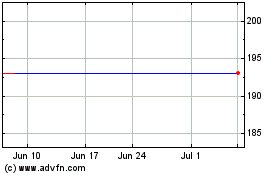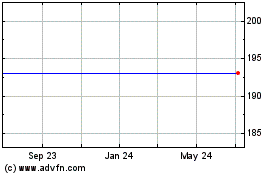By Sara Randazzo and Patrick Fitzgerald
Endo International PLC, Johnson & Johnson and other
drugmakers that face sprawling litigation over the opioid crisis
are exploring a way to settle the cases by participating in Purdue
Pharma LP's bankruptcy, according to internal documents and a
person familiar with the matter.
The move, if successful, could bring an end to -- or at least
dramatically shrink -- one of the largest and most complex pieces
of litigation the U.S. has ever seen.
Drugmakers and distributors face some 2,500 lawsuits brought by
virtually every state as well as cities, counties, Native American
tribes and others accusing the pharmaceutical industry of helping
fuel widespread opioid addiction.
The cases have become political flashpoints as communities look
for ways to recover money to address the costs of treating
addiction, including overstressed hospitals and first responders
and to care for babies born with opioid dependence.
Five drugmakers battling the cases -- Endo, J&J, Teva
Pharmaceutical Industries Ltd., Allergan PLC and Mallinckrodt PLC
-- are looking to enact a global settlement of the litigation that
would be implemented through OxyContin maker Purdue's chapter 11
case, according to a person familiar with the matter. The
mechanism, if successful, would allow the companies to contribute
money into a trust set up through the bankruptcy in exchange for a
complete release from liability.
The idea is still in the early stages, the person said, and no
dollar figures have yet been discussed. The concept would need
buy-in from Purdue and its owners, the Sackler family, as well as a
critical mass of state attorneys general and local municipalities
suing the companies. The bankruptcy judge overseeing Purdue's case
would also need to agree he has jurisdiction to allow the other
companies into the case.
A Purdue spokesman declined to comment.
Endo is working with lawyers at Skadden, Arps, Slate, Meagher
& Flom, the company's longtime corporate counsel, on the
proposed deal, according to internal documents and a person
familiar with the matter.
Endo, which makes the opioid painkiller Opana, isn't considering
filing for bankruptcy, the person said, though it faces significant
debt.
Purdue, which has been the primary target of plaintiffs in the
opioid litigation, entered bankruptcy court in mid-September to
implement a multibillion-dollar deal with about half the states and
thousands of local governments that would resolve much of the
litigation it faces.
Purdue has valued the settlement at $10 billion to $12 billion,
which includes at least $3 billion in cash from the Sacklers, as
well as money from future OxyContin sales and the development of
addiction-treatment drugs.
Purdue's proposed deal, however, still faces strong pushback
from mostly Democratic state attorneys general from some two dozen
states, including New York and Massachusetts. Adding other
companies into the talks could further complicate negotiations.
Endo, Allergan and Mallinckrodt recently reached settlements
cumulatively valued at $45 million to avoid a landmark opioid trial
slated to start in late October that will test the claims of Ohio's
Cuyahoga and Summit counties. That trial has been selected to serve
as a bellwether of some 2,000 of the opioid lawsuits centralized in
federal court in Cleveland.
The U.S. district court judge overseeing the thousands of
federal-court opioid cases, Dan Polster, has pushed both sides to
settle the cases rather than waste time and money in protracted
litigation. Finding a way to fully cap liability from cases brought
by local and state governments in different courts around the
country has been a challenge, however. Using Purdue's chapter 11
case could provide a way to resolve claims on a near-complete
basis.
A scenario in which companies use a bankruptcy proceeding to
resolve legal liabilities, without filing for bankruptcy
themselves, has some precedent.
Car makers that were sued along with Takata Corp. over defective
air bags had an option to contribute money and settle the cases
through Takata's bankruptcy plan.
The settlement mechanism was optional on both sides, and only
Honda Motor Co. had signed on as of February 2018, when Takata's
plan was confirmed. Unlike Purdue's co-defendant drugmakers, the
car makers were major creditors in Takata's bankruptcy since they
were owed money for funding the recall of millions of vehicles, as
well as funding the bankruptcy case.
Walmart Inc. in 2014 obtained a release of liability over
dangerous plastic gasoline cans as part of a $162 million
settlement built into the chapter 11 plan of Blitz USA, which made
the cans. The retailer had been sued for selling the Blitz
cans.
So-called third-party releases, which clear a company that is
not itself in bankruptcy of liability in exchange for some kind of
value, are prohibited in some parts of the country. That isn't the
case in New York, where Purdue filed for bankruptcy, or Delaware,
where Takata obtained protection.
Endo, Teva and Mallinckrodt each face significant debt in
addition to the opioid lawsuits. Reaching a global resolution could
help them avoid seeking bankruptcy protection or implementing
broader restructurings.
--Peg Brickley and Soma Biswas contributed to this article.
(END) Dow Jones Newswires
September 30, 2019 17:26 ET (21:26 GMT)
Copyright (c) 2019 Dow Jones & Company, Inc.
Allergan (NYSE:AGN)
Historical Stock Chart
From Mar 2024 to Apr 2024

Allergan (NYSE:AGN)
Historical Stock Chart
From Apr 2023 to Apr 2024
